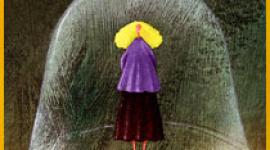Years Later, a Quieter Mind
 When psychologist Kay Redfield Jamison, Ph.D., wrote An Unquiet Mind, an account of her struggles with manic depressive illness--which she has both experienced and studied--she expected modest sales, mostly to people who had been directly affected by the disorder. But the 1995 book was a surprise hit, spending five months on the New York Times best-seller list and selling more than 400,000 copies. Part of its appeal came from the fascinating contrast between Jamison's elegant prose and the extreme, often brutal experiences she recounted. In person, the incongruity is even more startling: Jamison is graceful and self-possessed, but speaks frankly about the harrowing realities of mental illness.
When psychologist Kay Redfield Jamison, Ph.D., wrote An Unquiet Mind, an account of her struggles with manic depressive illness--which she has both experienced and studied--she expected modest sales, mostly to people who had been directly affected by the disorder. But the 1995 book was a surprise hit, spending five months on the New York Times best-seller list and selling more than 400,000 copies. Part of its appeal came from the fascinating contrast between Jamison's elegant prose and the extreme, often brutal experiences she recounted. In person, the incongruity is even more startling: Jamison is graceful and self-possessed, but speaks frankly about the harrowing realities of mental illness.
Seated in her office at the Johns Hopkins School of Medicine in Baltimore, Jamison reflects on the personal and professional price of that candor. Asked whether she would do it all again, she pauses for a long moment. "I think now, two years after the publication of the book, I'd say yes, it was worth it," she says at last. "But has it been costly? For sure." Jamison does acknowledge relief at being able to drop the "Brooks Brothers conservative" image she adopted to conceal her disorder, saying, "I hadn't realized the amount of time and energy I put into keeping this illness to myself. I am much more myself publicly than I was before." Her colleagues have been supportive, she says, and her status as a tenured professor made the disclosure less risky for her than for most people. "But you also have more to lose under those circumstances, because you've spent a long time building a certain reputation as a scientist," adds Jamison. "All of a sudden, your work is subject to questions: `What was her motivation? Was she objective?'"
It's not just her research that has undergone reappraisal. "As soon as somebody knows that you have a mental illness, they treat you differently," she says. "Particularly if you've written about being psychotic and delusional, people will question your judgment, your rationality." Jamison talks with resignation about the inevitable loss of privacy: "It would be disingenuous to write such a personal book and not expect people to respond." Perhaps more painful, though, was giving up her therapy practice. "I spent many years learning to be a clinician, and I loved doing it," she says. "But I've written a highly personal book. Patients have the right to walk into an office and deal with their own problems, not with what they construe their therapist's problems to be."
Despite her very public "coming out," Jamison still counsels caution to those considering revealing their illness to employers and others. Her emphasis is on encouraging people to acknowledge their mental disorders to themselves, and to get treatment. "There's no excuse in this day and age for seventeenth-century notions of mental illness," says Jamison, whose own manic-depression went untreated for years until it was brought under control by lithium "If you don't discuss it and don't seek treatment, you can die, and ruin a lot of lives around you."
Jamison saw some of those lives for herself while traveling the country to promote An Unquiet Mind. "At almost every talk I gave, somebody would come up to me with a photograph of a kid who had committed suicide," she relates. "The devastation was unbearable, all of that unnecessary pain and suffering. It just broke my heart." Jamison's next book, Night Falls Fast, will deal head-on with the topic of suicide, exploring the implications of recent neurological and psychological research. "It's been a relief to turn back to science," says Jamison. "You get into this business of talking about your own experiences and you forget why you went into science," " she continues, "which is that it's really interesting."
Also gratifying, she says, is her work on yet another book. Tentatively titled Beyond Dr. Doolittle, it's about medicine and science at the National Zoo. "The doctors there are confronted with an extraordinary range of medical problems," says Jamison. "Imagine treating 500 different species!" She pauses, then smiles. "Doctors around here have enough problems with just one."
next: Patty Duke: Bipolar Disorder's Original Poster Girl
~ bipolar disorder library
~ all bipolar disorder articles
APA Reference
Gluck, S.
(1998, February 1). Years Later, a Quieter Mind, HealthyPlace. Retrieved
on 2026, March 1 from https://www.healthyplace.com/bipolar-disorder/articles/years-later-a-quieter-mind



